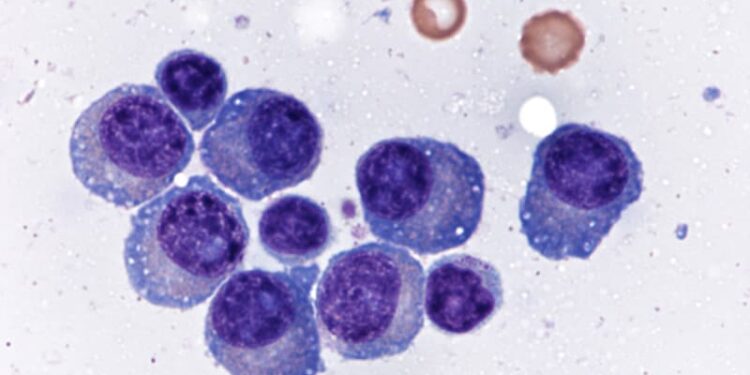TOPLINE:
In a retrospective study of 315 patients with relapsed/refractory multiple myeloma, retreatment with previously refractory drugs achieved an overall response rate of 56.2% and median progression-free survival of 11 months. Longer initial therapy duration and greater time gap between treatments were associated with superior outcomes.
METHODOLOGY:
- Researchers retrospectively reviewed patients with relapsed/refractory multiple myeloma who started new systemic therapy for disease progression between January 2015 and April 2022 at their institution.
- Analysis included 315 patients treated with a drug that their disease had previously been refractory to, defined as disease progression while receiving the drug or within 60 days of the last dose.
- Patient characteristics collected at diagnosis included age, sex, International Staging System stage, revised International Staging System stage, and interphase fluorescence in situ hybridization abnormalities.
- Investigators considered the first relapse after January 2015 requiring new systemic therapy as the index relapse and study start time.
TAKEAWAY:
- Analysis revealed an overall response rate of 56.2% and median progression-free survival of 11 months with retreatment.
- Patients with longer initial therapy duration with index drug (> 28.4 months) demonstrated superior progression-free survival (median, 16.9 vs 8.1 months; P
- Researchers found that patients with longer time gap between initial therapy and retreatment (> 46.1 months) showed better progression-free survival (median, 28.2 vs 8.9 months; P = .016).
- Among the 285 evaluable patients, 26% achieved partial response and 30.2% achieved very good partial response or better with retreatment.
IN PRACTICE:
“Retreatment with previously refractory drugs is a viable option for late line RRMM. Patients with a longer gap between initial line of therapy with index drug and retreatment had superior outcomes with retreatment,” wrote the authors of the study.
SOURCE:
The study was led by Utkarsh Goel, Division of Hematology, Mayo Clinic in Rochester. It was published online on December 24, 2024, in Blood Advances.
LIMITATIONS:
The retrospective nature and single-institution design of the study may introduce bias in terms of patient population and practice patterns. The favorable outcomes observed in patients with longer initial therapy duration and greater time between treatments could reflect selection bias toward more indolent disease biology. Despite adjusting for nonrefractory partner drugs during index relapse, residual bias may limit the ability to attribute outcomes solely to retreatment. The heterogeneous nature of treatments received during index relapse may limit comparisons across different groups.
DISCLOSURES:
Nelson Leung reported ties with AbbVie, Senseonics, Verrica Pharmaceuticals, and Omeros. Yi Lin disclosed relationships with multiple institutions, including Bristol Myers Squibb, Caribou Biosciences, and Janssen Oncology. Shaji Kumar reported ties with AbbVie, Bristol Myers Squibb/Celgene, and Janssen Oncology. Additional disclosures were noted in the original article.
This article was created using several editorial tools, including AI, as part of the process. Human editors reviewed this content before publication.
Source link : https://www.medscape.com/viewarticle/myeloma-can-failed-drugs-work-again-2025a10000xl?src=rss
Author :
Publish date : 2025-01-15 10:23:11
Copyright for syndicated content belongs to the linked Source.














